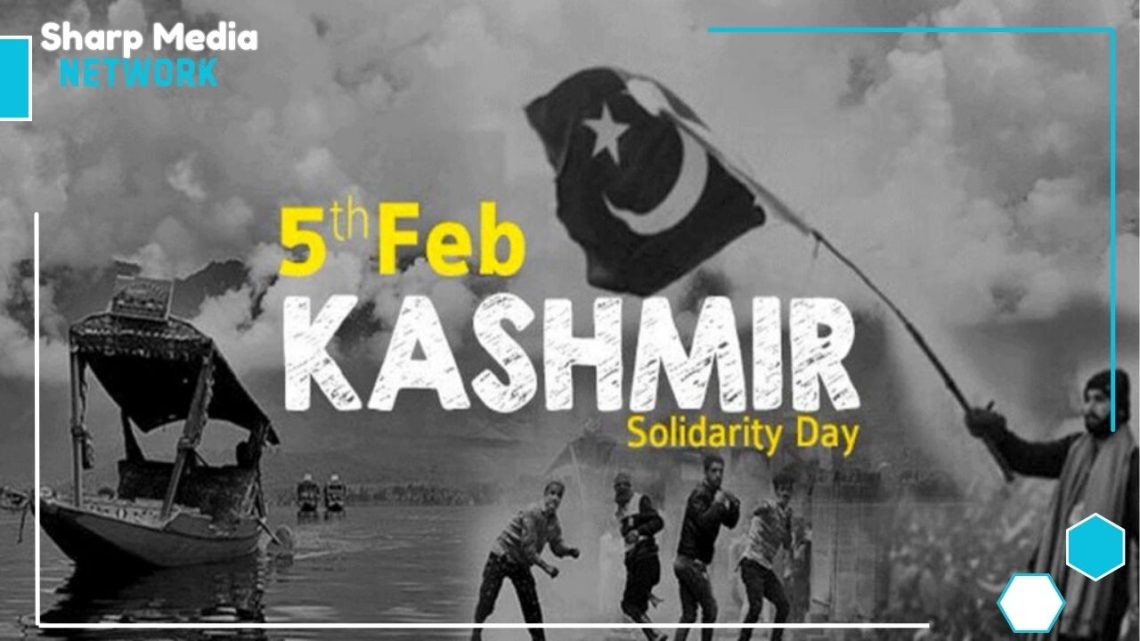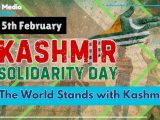
February 5: Why Solidarity Matters for Kashmiris?
February 4, 2025On Kashmir Solidarity Day, the global community is reminded that the struggle of Kashmiris for justice and freedom is not just their own, but a collective cause that calls for worldwide unity and action.
Kashmir Solidarity Day, observed annually on February 5, is more than just a day of remembrance—it’s a call for action, a reminder that the people of Indian Illegally Occupied Jammu and Kashmir (IIOJK) need the world’s support in their quest for justice, freedom, and dignity. Solidarity for Kashmiris is not just a political stance but a moral imperative, as their fight for rights and self-determination continues amidst overwhelming challenges.
The Kashmir dispute is rooted in the region’s history, particularly in the aftermath of the 1947 partition of British India. The princely state of IIOJK, with a Muslim-majority population, was expected to join Pakistan but was controversially annexed by India through the decision of the then-Maharaja Hari Singh. This set off decades of conflict and unrest, including multiple wars between India and Pakistan, and, most crucially, the continued denial of the Kashmiri people’s right to determine their future. Despite multiple United Nations resolutions calling for a plebiscite, Kashmiris have been left in limbo, under constant military occupation for over seven decades.
The revocation of Article 370 on August 5, 2019, was a pivotal moment that deepened the crisis. The move to strip IIOJK of its special status escalated the repression of the Kashmiri people, labeling their struggle for freedom as terrorism. The human rights violations that followed—ranging from extrajudicial killings to forced disappearances and the widespread use of draconian laws like the Armed Forces Special Powers Act (AFSPA)—left the region in a state of perpetual fear and silence. The world watched as India violated international law, but the silence of the international community was deafening.
This is where solidarity becomes crucial. Solidarity with Kashmiris is not just about offering symbolic gestures; it is about amplifying their voices and pushing for real, meaningful change. It is about holding governments and institutions accountable for human rights abuses and ensuring that Kashmiris’ right to self-determination is upheld. For Kashmiris, solidarity represents hope—a belief that the global community will not stand by as they suffer under occupation.
Kashmir Solidarity Day serves as a reminder of this responsibility. It is an opportunity to reflect on the sacrifices of Kashmiris, the strength of their resistance, and the continued struggle they face. Solidarity is more than a political slogan; it’s an essential part of the fight for justice. When the world unites in support of Kashmiris, it strengthens the call for peace and self-determination. It also helps challenge the narratives created by those in power who seek to silence the voices of Kashmir’s oppressed.
Furthermore, Kashmiris’ struggle for freedom is not just a local issue. It has global implications. As one of the most militarized regions in the world, Kashmir’s unresolved status threatens regional stability and global peace. The human rights abuses taking place there do not only affect Kashmiris—they affect the integrity of international law, the credibility of global institutions, and the principles of democracy and justice.
By standing in solidarity with Kashmiris, the world sends a clear message to those in power: the oppression of the Kashmiri people will not go unnoticed. Solidarity fosters international awareness, encourages governments to take action, and holds perpetrators of violence accountable. It also empowers Kashmiri freedom fighters, who continue to struggle in the face of immense adversity.
Solidarity matters because it transforms an isolated struggle into a global cause. It demonstrates that Kashmiris are not alone, that the world is watching, and that their right to freedom and self-determination is a shared responsibility. The collective strength of global support can help bring about the changes Kashmiris have long been denied.
As Kashmir Solidarity Day draws attention to the ongoing humanitarian crisis, it is a call for the world to not turn a blind eye to the suffering of the Kashmiri people. Solidarity is the lifeline of any oppressed community, and for Kashmiris, it is the beacon of hope they desperately need. It is time for the world to come together, honor its promises, and demand justice for Kashmir.

